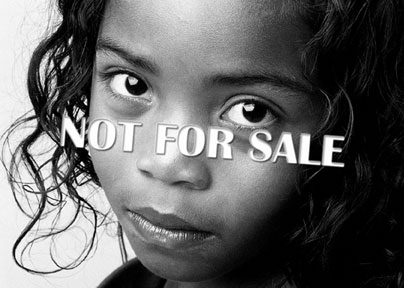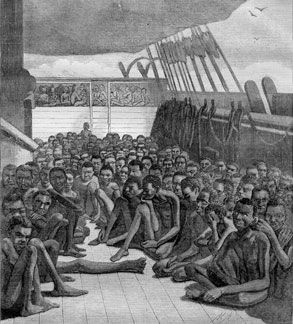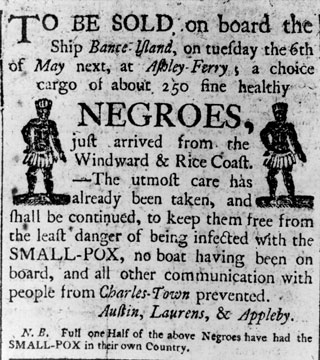|
World anti-slavery day tomorrow:
Slavery: A black mark on human conscience
By Pramod DE SILVA
 Slavery is an abhorrent word, a word that conjures the worst of
humanity and the depraved depths to which some men descend to rule over
others. In simple terms, slavery means forced labour and the transport
of people for such labour. Slavery is an abhorrent word, a word that conjures the worst of
humanity and the depraved depths to which some men descend to rule over
others. In simple terms, slavery means forced labour and the transport
of people for such labour.
Slavery is as old as civilisation itself. The widely-held perception
is that slavery is no more, but nothing could be further from the truth.
It may not be so explicit as in the earlier days, but the practice still
lingers.
Yet, the worst forms of slavery are now history. Slavery used to be a
lucrative trade, as vividly depicted in the Alex Haley book and tele-serial
Roots. It is a black mark on human history that we should look back
upon, to learn the relevant lessons for today.
This is why the world commemorates the abolition of all formal forms
of slavery on August 23 every year - the International Day for the
Remembrance of the Slave Trade and its Abolition.
It was on the night of August 22-23, 1791, in Santo Domingo (today
Haiti and the Dominican Republic) that the uprising that would play a
crucial role in the abolition of the transatlantic slave trade began.
The slave rebellion in the area weakened the Caribbean colonial system,
sparking an uprising that led to abolishing slavery and giving the
island its independence. It marked the beginning of the destruction of
the slavery system, the slave trade and colonialism itself. The
International Day for the Remembrance of the Slave Trade marks this
momentous event and its ramifications.
The International Day for the Remembrance of the Slave Trade and its
Abolition is intended to inscribe the tragedy of the transatlantic slave
trade in the memory of people the world over. The Day is focused on
bringing to light all aspects of slavery, which is essential to
constructing an overall view of this massive human tragedy.
The International Day for the Remembrance of the Slave Trade and its
Abolition was first celebrated in a number of countries, in particular
in Haiti (August 23, 1998) and Senegal (August 23, 1999).
 |
|
Slaves being
transported by ship |
The UN's lead agency for anti-slavery activities is UNESCO, which has
organised several initiatives this year as well. Each year the UN
invites people all over the world, including educators, students and
artistes, to organise events that centre on the theme of this day.
Theatre companies, cultural organisations, musicians and artistes take
part in this day's activities by expressing their resistance against
slavery through performances that involve music, dance and drama.
Educators promote the day by informing people about the historical
events associated with the slave trade, the consequences of the slave
trade, and to promote tolerance and human rights. Many organisations,
including youth associations, government agencies, and non-governmental
organisations, actively take part in the event to educate society about
the negative consequences of the slave trade.
Who or what exactly is a slave? "To be a slave is to be controlled by
another person or persons so that your will does not determine your
life's course, and rewards for your work and sacrifices are not yours to
claim," says Kevin Bales, one of the world's leading experts on
contemporary slavery. "People are enslaved by violence and held against
their wills for purposes of exploitation."
He notes that while people today most likely believe that slavery is
a thing of the past, the practice is still thriving wherever poverty,
social conditions, and gullibility can be exploited. Bale estimates that
there are 27 million slaves in the world today.
Official definition
What is the official definition of Slavery ?"...the status or
condition of a person over whom any or all of the powers attaching to
the right of ownership are exercised. All acts involved in the capture,
acquisition or disposal of a person with intent to reduce him to
slavery; all acts involved in the acquisition of a slave with a view to
selling or exchanging him; all acts of disposal by sale or exchange of a
slave acquired with a view to being sold or exchanged, and, in general,
every act of trade or transport in slaves by whatever means of
conveyance." (Article 1.2, Slavery Convention, 1926)
The 1926 Convention's definition of slavery was broadened to include
forced or compulsory labour in 1930 in the International Labour
Organisation (ILO) Convention.
"...all work or service which is exacted from any person under the
menace of any penalty and for which the said person has not offered
himself voluntarily."
According to the Universal Declaration of Human Rights, "no one shall
be held in slavery or servitude; slavery and the slave trade shall be
prohibited in all their forms".
According to the United Nations, four million people a year are
traded against their will to work. The majority of them come from
Southeast Asia, Eastern Europe and Latin America.
The modern world abhors slavery, even though it still lurks in the
shadows.
 |
|
A notice announcing a
slave auction |
There are many forms of slavery even in the present world including
1) debt bondage: the status or condition arising from a pledge by a
debtor of his personal services or of those of a person under his
control as security for a debt;
2) serfdom - the condition or status of a tenant who is by law,
custom or agreement bound to live and labour on land belonging to
another person and to render some determinate service to such other
person;
3) Servile forms of marriage: a woman, without the right to refuse,
is promised or given in marriage on payment of a consideration in money
or in kind to her parents, guardian, family or any other person or
group; or the husband of a woman, his family, or his clan, has the right
to transfer her to another person for value received or otherwise;
4) The exploitation of children and adolescents for labour - there
are an estimated 180 million child labourers in the world. Children are
often conscripted for combat duties by terrorist groups, as the LTTE did
in Sri Lanka. These children are deprived of parental care, education,
basic needs and nutritious food.
The trafficking of young girls and women for prostitution is perhaps
the worst form of slavery in the present day. Nicholas Kristof, the
author of the ground-breaking new book "Half the Sky: How to Change the
World" (Virago Publishers, UK) says that trafficking in women is the
"greatest moral outrage of the century". He says more than eight million
women are trafficked across borders every year for prostitution and
physical labour. In the latter category, many domestic servants are
underpaid and overworked.
Medical slavery is a relatively unknown phenomenon whereby body
organs are snatched from unwilling donors, including children,
especially in the Third World. Some of the victims die due to lack of
medical care.
Freedom of movement
All slaves, ancient and modern, have no freedom of movement. They
have little or no personal belongings. They have no defined work hours,
with some working up to 22 hours a day. They are often deprived of rest,
sleep, food and social relationships. In effect, all aspects of their
lives are tightly controlled by their 'handlers'. It is also somewhat
disconcerting to note that some of the products we consume may have been
made by adults and children who are slaves in all but name. Modern
slavery is a worldwide problem, affecting both developed and developing
countries.
It is surprising that most countries do not have adequate laws to
deal with modern forms of slavery. Some societies accept forms of
slavery such as child marriages and child labour as quite ordinary
occurrences, compounding the problem. The exploited individuals have no
voice in the established order of things and not many others question
the setup either. That is a tragedy that prevents stronger action
against the shadowy slave traders.
The world can be satisfied that the old slave trade, a blot on
humanity, is no more. But are even more demeaning forms of slavery
making a comeback? That is the problem that we have to find solutions
for. It is a challenge that the world has to face collectively. From the
US to Brazil to Mauritania, various forms of slavery still exist,
challenging modern moral values and ethical standards.
It will be a Herculean task to eradicate all forms of exploitation of
labour, but Governments should crack down on instances of trafficking of
labour, child labour and ancient social practices which somehow are not
compatible with modern values. The UNESCO and the ILO can show the way
and individual Governments must rise to the challenge. A world without
slavery should be the ideal goal - and it is still possible. Tomorrow
should be an eye-opener for the entire world on the abominable practice
of slavery.
|

